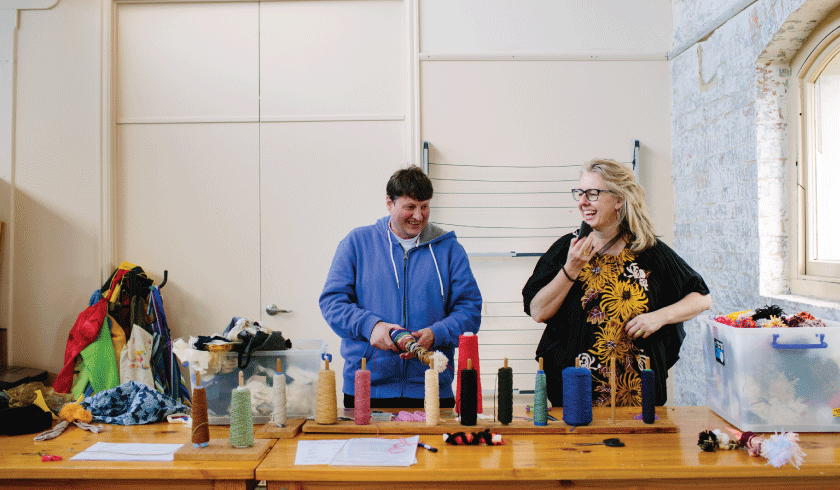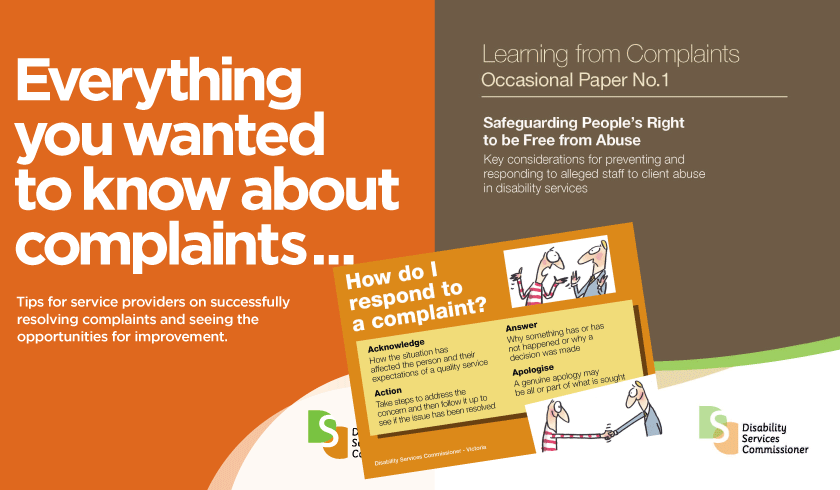So you made a complaint about a Victorian disability service provider. What happens now? Click on the links below to jump to a section of the Disability Services Commissioner (DSC) complaints process.
Who will handle my complaint?
When you call us, a member of the Resolutions team will take the call.
If you are not sure whether you want to make a complaint, you can still call us to talk about what’s on your mind. You don’t need to provide evidence about what’s worrying you. We can help you over the phone with advice and information, and you can decide what you want to do from there.
Back to top
Assessment
The Resolutions Officer will discuss your complaint with you (see How to Make a Complaint). DSC will send you written confirmation of the issues we can and can’t deal with in your complaint, and what outcomes you’re seeking.
If the complaint is on behalf of a person with a disability, we will speak with them where possible to gain their consent to proceed with assessment. Our focus is on the person with a disability and their needs, and we seek to involve them in the process.
To assess a complaint, we:
- work with you and the person with a disability to fully understand your complaint and how it can be resolved
- request information and documentation for evidence-based assessment
- talk to the service to get their views about your complaint and we may ask them how they might respond to the complaint
- talk to you about the information we get from the service
- work closely with you, the person with a disability and the service to find ways to resolve the complaint
Your complaint may be resolved during the assessment stage. Many complaints can be resolved through us working with you, the person with a disability and the service to get outcomes using the Four A’s – Acknowledgement, Answers, Actions or an Apology.
If the complaint cannot be resolved during the assessment stage, the Commissioner may decide to refer the complaint to conciliation or investigation.
You may also like to read our frequently asked questions, learn about your rights and responsibilities, or download an information sheet.
Back to top
Conciliation
Conciliation can be offered as a way to try to resolve a complaint that was unable to be resolved during the assessment stage. The most common form of conciliation is a conference between you, the person with a disability and the service provider.
The purpose of a conciliation conference is to help you to reach an agreement on how the complaint can be resolved. We will facilitate the conciliation and help to clarify the issues, gather information and encourage discussions between people at the conciliation conference. We do not advocate for either the person or the service. It is not a public hearing, a court, or a tribunal.
Each person is given the opportunity to put forward their views. Because of this conciliation may be preferable for some people as this person-centred approach allows the person making the complaint to have their views heard directly by the service provider.
Outcomes of conciliation depend on what is agreed at the conciliation by the people at the conference. This process may take up to four hours with breaks.
You may also like to read our frequently asked questions, learn about your rights and responsibilities, or download an information sheet.
Back to top
Investigation
DSC has powers under s. 118 of the Disability Act 2006 (the Act) to investigate complaints, where the Commissioner has determined that the complaint is not suitable for conciliation or when conciliation has failed and the Commissioner assesses that further action is required.
When conducting an investigation DSC can compel service providers to provide information and documents (ss. 132L-132T of the Act). The power to compel evidence for investigations allows DSC access to valuable information and first-person accounts of any incidents of concern. This enhances our ability to make informed decisions.
DSC may use inspection powers to inspect the premises of a disability service during the course of an investigation. In using inspection powers, DSC does not need to notify the service provider in advance of the visit.
At the conclusion of an investigation, the Commissioner determines whether the complaint is justified (s. 118(4) of the Act). Where a complaint is justified, DSC can issue a Notice to Take Action to the service provider (s.119 of the Act). The service provider must report back to DSC on the actions they have taken to comply with this Notice (s. 128P of the Act). If DSC is not satisfied with the service provider’s actions, the Commissioner can decide to conduct a follow-up investigation (s. 128R of the Act).
Working with Victoria Police
Where it becomes evident that a complaint involves potential criminal conduct, DSC will refer the relevant aspects of that complaint to Victoria Police. To assist in ensuring access to justice for people with a disability, DSC and Victoria Police have a protocol to guide how our organisations work together collaboratively, cooperatively and transparently when investigating to achieve our common objective of protecting the safety and welfare of people with a disability.
You may also like to read our frequently asked questions, learn about your rights and responsibilities, or download an information sheet.
Back to top










